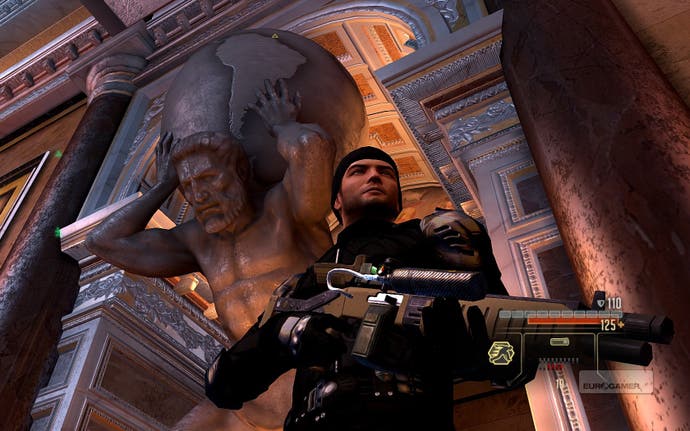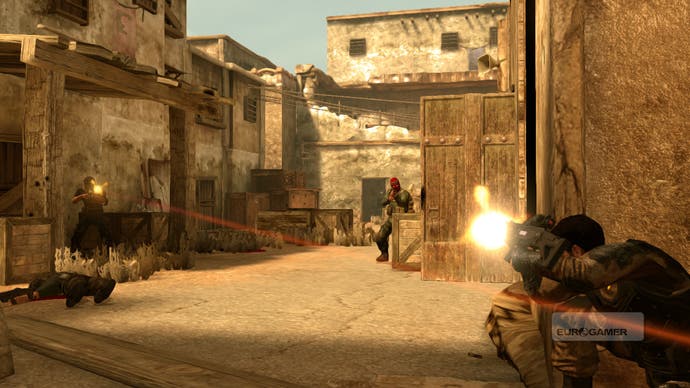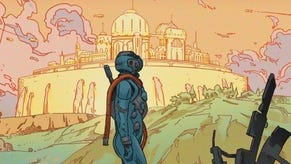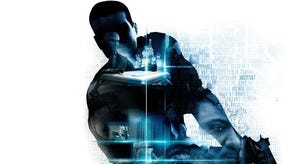Alpha Protocol
Diamonds take forever.
In the genre-bending world of modern videogames, things are not always what they seem. Alpha Protocol looks, walks and talks like a shooter, but it's not - under the hood it's a skills-based RPG. It's far more about character stats than firepower, and interactive cut-scenes form a substantial portion of the action.
This has a lot of counter-intuitive implications. Empty a clip of bullets into an enemy's head, and the damage done is determined by your character sheet rather than where you're aiming or how powerful the gun is - so you can rush up to a boss and unload a shotgun into his stomach, and it will do practically no damage if your shotgun stat isn't high. Try to fire an assault rifle from far away without the requisite skill points, and you simply won't hit anything, no matter where you aim.
The same goes for melee attacks. Walking up to an enemy and attacking them hand to hand without a high enough skill level means that they will simply block your every move. Similarly, the game's hacking and lockpicking mini-games are incredibly difficult unless you have a high Sabotage stat.
Like a shooter, Alpha Protocol is a game about a man with a gun solving political unrest with bullets. Unlike a shooter, your health doesn't recharge with time (although your shields do, to an extent). Unlike a shooter, you have to decide whether you want to prioritise hit points or offensive power or tech skills.
You have to manage your inventory, and spend a lot of time in menu screens, customising equipment or reading emails or dossiers that flesh out the characters and political conspiracies at the heart of the story. You also spend a lot of time talking, forming relationships with key characters in interactive cut-scenes by choosing from a selection of conversational responses.

Alpha Protocol is certainly different, and playing it necessitates a recalibration of your third-person shooter instincts. It feels completely wrong at first that shooting at enemies can do little to no damage, or that you have to stay out of cover with your reticule trained on someone for five seconds in order to get a critical hit. Over the course of four hours with the game, though, it did begin to make sense.
There's a static main character, Michael Thorton, an American agent for an agency secret enough for the government to deny its existence. You can tweak his appearance (in my case, to make him look like a backwards-baseball-cap-wearing Fidel Castro), but like Mass Effect's Commander Shepard, he is his own man. Your influence upon him extends to which skills you give him, and how you choose to make him respond in conversations.
Between missions, Thorton usually heads out for a chat with some of his contacts, or his government handlers. During these interactive cut-scenes you can choose one of three responses with the face buttons - hit the right tone and characters will start to like you more, which can have beneficial effects in later missions. A few helpful militia might turn up to fight if their leader is friends with Thorton, for instance, or you might gain access to some extra information or a weapon drop for the next mission.

These conversational responses are broadly grouped into Suave, Aggressive or Professional; lady characters might respond well to a suave approach, whereas politicians prefer professionalism.
There are two main problems with this at the moment: first, choosing wildly differing responses makes Thorton come across as a mentalist, and second, almost everything that Thorton says makes you want to either roll your eyes or punch him in the teeth. He's an arrogant smartarse, and his delivery often falls well wide of the intended Jack Bauer or James Bond mark.









